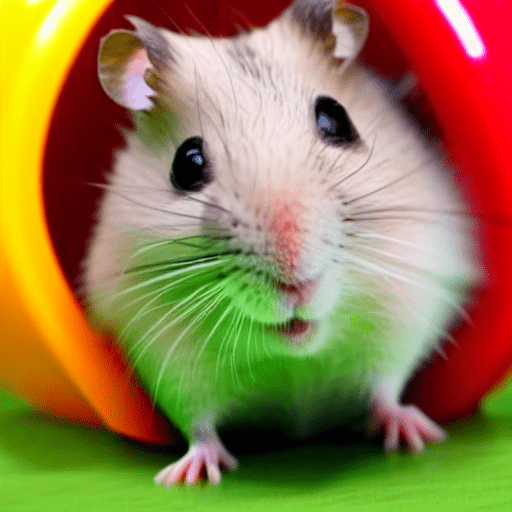Can Hamster Have Celery? The Ultimate Guide
Yes, hamsters can have celery in moderation as a healthy and safe treat option. When it comes to hamster diets, it’s important to provide them with a variety of fruits and vegetables for a balanced nutrition.
Celery, being low in calories and high in fiber, can be a great addition to their diet. It not only helps in maintaining their dental health but also aids in digestion. However, celery should be given in small pieces to prevent choking hazards and any uneaten portions should be removed to prevent it from going bad.
Remember to introduce new foods gradually to avoid digestive issues, and consult a veterinarian if you have any concerns.
The Nutritional Value Of Celery For Hamsters
Celery is a nutritious snack that can be given to hamsters. It contains a variety of essential vitamins and minerals including vitamin A, vitamin K, vitamin C, potassium, and folate. These nutrients promote overall health and support hamsters’ immune systems. An important component of celery is its fiber content. Fiber aids in digestion and helps prevent constipation in hamsters. It also promotes a healthy and regular bowel movement. Including celery in a hamster’s diet can prevent digestive issues and keep their gastrointestinal tract functioning properly. When offering celery to hamsters, it is important to consider the portion size. Hamsters have small bodies and can be susceptible to overeating. A recommended portion size is a few small pieces of celery, about the size of their paw. Feeding celery in moderation ensures a balanced diet and prevents obesity in hamsters.
Can Celery Be Harmful To Hamsters?
Feeding celery to hamsters can be a topic of concern for pet owners. Celery is generally safe for hamsters to consume, as it provides essential nutrients like fiber, vitamins, and minerals. However, there are a few potential risks and concerns to keep in mind. One concern is that celery can be a choking hazard for hamsters, especially if it is not cut into small, manageable pieces. To minimize this risk, it is important to chop celery into small, bite-sized portions that your hamster can easily eat. Additionally, some hamsters may have difficulty digesting the stringy fibers in celery, which can potentially lead to digestive issues. Another consideration is the possibility of pesticide residue on celery. It is crucial to thoroughly wash any celery before offering it to your hamster to minimize exposure to harmful chemicals. Organic celery can be a safer option, as it is grown without the use of pesticides. In conclusion, although celery can be a healthy addition to a hamster’s diet, it is important to take proper preparation and precautions. Ensure the celery is cut into small pieces, wash it thoroughly to remove any pesticide residue, and monitor your hamster for any signs of digestive issues. By following these guidelines, you can safely include celery as a part of your hamster’s diet.
Introducing Celery To A Hamster’s Diet
Introducing celery to a hamster’s diet can be a beneficial addition to their nutrition. However, it is important to gradually introduce celery to prevent any digestive issues. Start by offering small pieces of celery alongside their regular food. Observe how your hamster reacts and if they enjoy eating it. When mixing celery with other hamster-friendly foods, it’s important to consider the nutritional value of each ingredient. Celery can be combined with other vegetables and fruits that are safe for hamsters, such as carrots, cucumber, and apple slices. By incorporating a variety of foods, you can provide a well-rounded diet for your hamster. Remember to wash the celery thoroughly before giving it to your hamster and remove any leaves or tough parts that may pose a choking hazard. Always provide fresh water alongside the celery and monitor your hamster’s intake to ensure they are not overeating.
Benefits Of Celery For Hamsters
Can hamsters have celery? The answer is yes, and there are several benefits of celery for hamsters. Celery is a great way to promote hydration in hamsters, as it is primarily composed of water. It can help keep your hamster hydrated and prevent dehydration, which is especially important during hot weather or if your hamster has diarrhea. Celery is also beneficial for hamsters’ dental health. Chewing on celery can help wear down their continuously growing teeth, preventing them from becoming overgrown. It also provides some fibrous content, which can aid in digestion. When offering celery to your hamster, make sure to cut it into small, bite-sized pieces to avoid any choking hazards. Introduce it gradually into their diet and monitor how they respond. Remember that celery should supplement your hamster’s regular diet and not be the main component.
Alternative Vegetables For Hamsters
Hamsters can eat a variety of vegetables for a healthy and balanced diet. While celery is safe for hamsters and contains essential vitamins and minerals, there are other alternative vegetables that can provide additional nutritional benefits. Here is a list of safe vegetables for hamsters:
| Bell Peppers | Rich in vitamin C and antioxidants. |
| Cucumber | High water content and a good source of hydration. |
| Carrots | Provide essential nutrients like vitamin A and beta-carotene. |
| Zucchini | Low in calories and high in fiber, promoting digestive health. |
These alternative vegetables offer a range of nutritional benefits for hamsters compared to celery. Incorporating a variety of vegetables into their diet can support their overall well-being. Remember to introduce new foods gradually and in moderation to avoid digestive issues. Providing a balanced diet contributes to a happy and healthy hamster.
Homemade Treats With Celery For Hamsters
Homemade treats can be a great addition to your hamster’s diet, and celery is a healthy option to consider. Celery is low in calories and high in fiber, making it a suitable choice for hamsters. However, it’s important to keep a few considerations in mind when preparing celery-based snacks for your furry friend. Firstly, always remember to wash the celery thoroughly to remove any pesticides or dirt. Organic celery is preferred to minimize the risk of exposure to harmful chemicals. Additionally, ensure that the celery is fresh and crisp, as wilted or spoiled celery can be harmful to your hamster’s health. When introducing celery to your hamster’s diet, start with small portions to prevent digestive upset. Like humans, some hamsters may have individual preferences or sensitivities, so it’s important to monitor their reaction to celery treats. If your hamster enjoys celery, you can explore various recipes, such as celery sticks with peanut butter filling or celery and apple mash, as long as they are prepared in small, appropriate portions. Overall, celery can be a nutritious and tasty treat for your hamster. Just remember to be mindful of the quantity and quality of the celery and observe your hamster’s response to ensure their well-being.
A Balanced Diet For Hamsters
A hamster’s diet should be balanced to ensure their overall health and well-being. One important aspect of a balanced diet for hamsters is the inclusion of a variety of foods. Including different food types in their diet helps provide them with the necessary nutrients they need. One food that many hamsters can enjoy is celery. Celery is a crunchy and hydrating vegetable that can be a healthy addition to a hamster’s diet. It is low in calories and high in fiber, which can aid in digestion. However, it is important to feed celery to hamsters in moderation. While it can be a nutritious treat, it should not be the sole focus of their diet. Hamsters require a mix of veggies, fruits, seeds, and grains to ensure they get a well-rounded and balanced diet. Including a variety of food options in their daily meals will not only provide different nutrients but also add stimulation and variety to their feeding routine. Remember to introduce new foods gradually and monitor your hamster’s response. If you notice any signs of digestive upset or allergies, discontinue feeding that particular food. Always consult with a veterinarian for guidance on your hamster’s diet and nutrition.
Frequently Asked Questions For Can hamster Have Celery
Can Hamsters Eat Celery?
Yes, hamsters can eat celery. Celery is a safe and nutritious treat for hamsters. It is low in calories and high in vitamins and minerals that are beneficial for their health. However, it should be given in moderation as too much celery can cause digestive issues.
Is Celery Good For Hamsters?
Celery is not only safe for hamsters but also good for their health. It is a great source of vitamins A, K, and C, as well as minerals like potassium and folate. It also contains fiber, which helps in digestion.
Just make sure to give it in small, bite-sized pieces.
How Often Can Hamsters Eat Celery?
Hamsters can have celery as an occasional treat. It should not be a part of their daily diet. You can offer a small piece of celery once or twice a week to provide them with some variety and extra nutrients.
Remember to always introduce new foods slowly and in small quantities to avoid any digestive issues.
Is It Safe for Rabbits to Eat Celery?
Is it safe for rabbits to eat celery? Many pet owners wonder about the rabbits and hamster food compatibility. While celery is generally safe for rabbits to consume, it should be given in moderation. The high fiber content can be beneficial for their digestion, but excessive intake may cause digestive issues. Always introduce new foods slowly and observe your rabbit’s reaction.
Conclusion
Celery can be a safe and healthy treat for your hamster in moderation. However, it is important to remove all the strings and wash it thoroughly before feeding. Remember, a balanced diet is key for your furry friend’s overall well-being.
Always consult a veterinarian for any specific dietary recommendations to ensure your hamster’s optimal health.

